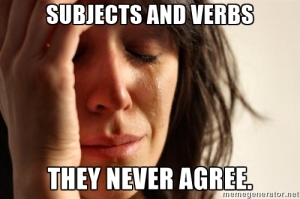
How the “All Your Base Are Belong To Us Meme” came to be.

You might have heard of this meme before or variations of it. But do you know where this meme comes from and why this grammatical error became so popular?
It started in 1989 when a video game called Zero Wing came out on the SEGA Mega Drive gaming system. The phrase comes from a poor translation of the phrase “all of your bases are now under our control.”
Let’s break this phrase down to see what is happening here grammatically.
The subject in this phrase should be “bases”, a plural subject, but the video game translation used the singular “base”. This grammar error and a few other mistakes like leaving out “of your” and using the helping verb “are” with “belong” led to this phrase taking over the internet.
In this post, we are going to focus on how subject-verb agreement works so that you can avoid becoming an internet meme (unless you want to, of course.)
Here’s how it works.
First, you need to understand the difference between a subject and a verb and what the term subject-verb agreement is all about.
The most basic sentence has two main parts, a subject and a verb.
See below:
She grew.
He flew.
Elves exist.
Words hurt.
In these sentences the subject comes first and then the verb follows. This is true for most sentences, but not all. The English language is tricky in that for every rule, there are many exceptions.
Identifying the subject in a sentence is not always so easy.
Take the following examples:
- He who must not be named is a great, but terrible wizard.
- Both Cinderella and the werewolf need to be home by midnight.
- There is a boy with a scar on his forehead who lived.
- How will the young wizards and witches defeat the dragons and steal their eggs?
The correct subject for each of these sentences is:
- He who must not be named is a great, but terrible wizard.
- Both cinderella and the werewolf need to be home by midnight.
- There is a boy with a scar on his forehead who lived.
- How will the young wizards and witches defeat the dragons and steal their eggs?
One trick to identifying the subject is to see if you can replace it with “it” or “they”. If you can do that and the sentence still makes sense, then you’ve probably found the right subject.
Now that you know how to identify the subject, let’s move on to making verbs and subjects agree.
Subjects and verbs need to agree in number. This means that if the subject is singular, then it should correspond with a singular verb. If the subject is plural, then you should have a plural verb.
It sounds pretty basic in those terms, but there are some tricky situations to keep an eye out for. We’ll go over the basics first and then we’ll move on to the tricky situations that will help you crack the verbal ability section on aptitude exams.
In present tense, a sentence with a singular subject has a verb ending in “s” or “es”. For plural subjects, you remove the “s”.
E.g. The boy wishes.
The boys wish.
In the simple past tense, there is no change to the verb for a plural subject.
E.g. The boy wished.
The boys wished.
When the helping verbs has/have, is/are, was/were, and does/do are used with another verb, then there are subject-verb agreement rules.
E.g. They have shown us the magic trick.
He has shown us the magic trick.

Tricky situation #1: Personal Pronouns Exception
When using “I” or “you”, we use the plural form of a verb.
E.g. You are at the hockey game.
He is at the hockey game.
I choose to be a part of this.
She chose to be a part of this.
Compound Subjects:
As we mentioned above, sometimes subjects are joined by clauses or include more than one person and this can make the subject verb agreement rules difficult to determine.
Tricky situation #2: When subjects are joined by and
Think of “and” as the glue that binds subjects together. Once “and” is part of the subject, it makes them a whole subject which is always plural.
E.g. Sam and Frodo need to return the ring to Mordor.
Tricky situation #3: When subjects are joined by or
Think of “or” as a magnet that repels the two phrases on either side of it. They cannot join, so the verb only agrees with the subject closest to it.
E.g. Either Sam or Frodo needs to return the ring to Mordor.
Frodo is singular, so the verb gets an “s” added to it.
If one of the subjects is singular and the other plural, the verb agrees with the subject that is closest to it.
E.g. Either Sam or the elves are in grave danger.
Either the orcs or Smeagle is going to steal the ring.
Tricky situation #4: When a collective noun is used
Some subjects sound plural, but are actually something called a collective noun and they take a singular form. For example, some collective nouns are “family”, “group”, “organization”, and “team”. Others might be nouns like “news”, “politics”, or “economics”.
These nouns are treated as singular subjects.
E.g.
The team performs completely in sync.
Similarly, indefinite pronouns like “each”, “everyone”, “nobody”, “anyone”, and “someone” are all treated as singular subjects.
E.g.
Everyone is at the mall today.
The exceptions to this rule are: both, many, few, several, and others.
These indefinite pronouns take the plural form.
E.g. Both of us are feeling hungry right now.
A few of us are going to head out for chai.
Tricky situation #5: When prepositional phrases or phrases that start with who/that/which are a part of the subject
We saw some of these phrases in the examples I gave earlier.
E.g. He who must not be named is an evil but great wizard.
The trick to figuring out the subject verb agreement in these sentences is to completely ignore the prepositional or adjective phrase. You can block that part out with your thumb and you will get the phrase “He is an evil but great wizard.” This is way less complicated!
Tricky situation #6: Random exceptions
Leave it to the English language to give you random exceptions every time you figure out the rules.
The following words are treated as plural subjects: scissors, tweezers, trousers, pants, and shears. You can remember this because all of these nouns have two parts to them.
E.g. The left-handed scissors are of no use to me because I am right-handed!
Can you fix the following sentences? Comment below with your answers.
- Hermione along with the Quidditch player, Victor Krum, are going to the Yule Ball together.
- Neither Hagrid nor Dumbledore are going to die in this book.
- A few of the members of the Order of the Phoenix is going to join us in the fight against Voldemort.
- Either Kristi or the people at Leap is a nerd that likes to write about Harry Potter and the Lord of the Rings.
- The statistics shows that people with better soft skills end up advancing more in their careers.
Now all of the answers about subject-verb agreement are belongs to us, or should we say, all of the answers about subject-verb agreement belong to us?
(Written by Kristi Littleton)

I learned (learnt?) a few things here so, many thanks.
LikeLike